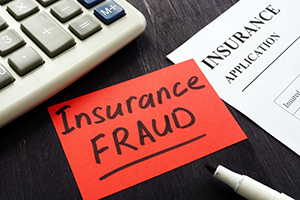Connecticut General Statutes § 53a-215 – Insurance Fraud
 Being accused of Insurance Fraud under C.G.S. § 53a-215 is a serious felony offense in Connecticut. Prosecutors treat these cases as high-priority financial crimes, often involving insurance companies, investigators, and law enforcement task forces. A conviction can mean hefty fines, years in prison, and a permanent felony record.
Being accused of Insurance Fraud under C.G.S. § 53a-215 is a serious felony offense in Connecticut. Prosecutors treat these cases as high-priority financial crimes, often involving insurance companies, investigators, and law enforcement task forces. A conviction can mean hefty fines, years in prison, and a permanent felony record.
At Allan F. Friedman Criminal Lawyer, we have over 30 years of experience defending clients accused of fraud, larceny, and other financial crimes. We understand how these cases are built—and how to dismantle them.
Definition of Insurance FraudUnder C.G.S. § 53a-215, a person commits Insurance Fraud when, with intent to injure, defraud, or deceive, they:
- Present or cause to be presented a written or oral statement in support of an insurance claim,
- Knowing the statement contains false, incomplete, or misleading information concerning a material fact.
This statute applies to all types of insurance, including:
- Auto insurance claims
- Homeowners and property insurance claims
- Health insurance claims
- Commercial/business insurance claims
Even exaggerating legitimate claims can lead to criminal prosecution under this law.
Penalties for Insurance FraudInsurance Fraud is a Class D felony in Connecticut. A conviction carries:
- Up to 5 years in prison
- Fines of up to $5,000
- Restitution for any alleged losses
Collateral consequences include:
- A permanent felony record
- Increased scrutiny on future insurance applications
- Damage to professional reputation
- Potential loss of professional licenses
- Immigration consequences for non-citizens
In large-scale or repeated schemes, prosecutors may add Larceny in the First or Second Degree charges, significantly increasing potential penalties.
How These Cases Are Investigated and ProsecutedInsurance fraud cases typically involve:
- Insurance company investigators
- Surveillance evidence (video/photo of alleged activity)
- Medical records and billing reviews
- Digital communications (emails, texts supporting the claim)
The Connecticut Insurance Department Fraud Division often works with local police or federal authorities to build a case before charges are filed, making early legal intervention essential.
Defenses to Insurance FraudCommon defenses include:
- Lack of Intent: Mistakes, omissions, or clerical errors are not crimes without intent to defraud.
- Truthful Claim: The claim was legitimate and supported by evidence.
- Insufficient Proof: The state cannot prove beyond a reasonable doubt that you knowingly submitted false information.
- Improper Investigation: Evidence obtained illegally or with bias can be challenged and suppressed.
Many first-time defendants may qualify for Connecticut’s Accelerated Rehabilitation (AR) Program, which can result in dismissal and erasure of charges.
Related OffensesInsurance Fraud is often charged alongside:
- Larceny in the First Degree (C.G.S. § 53a-122) – Theft exceeding $20,000
- Larceny in the Second Degree (C.G.S. § 53a-123) – Theft exceeding $10,000
- Identity Theft (C.G.S. § 53a-129) – Using another’s information to file claims
- Computer Crime (C.G.S. § 53a-251) – Digital submission of fraudulent documents
- Filing a claim for damage that never occurred.
- Inflating repair costs after a legitimate accident.
- Submitting false medical bills for treatment never received.
- Claiming a stolen vehicle when it was hidden or sold.
- Over 30 years defending financial crimes in Connecticut.
- Skilled in challenging investigative methods and digital/transactional evidence.
- Proven record of reducing or dismissing fraud charges.
- Personalized defense strategies tailored to your unique case.
If you are under investigation or have been charged with Insurance Fraud under C.G.S. § 53a-215, do not wait until it’s too late. Call Allan F. Friedman Criminal Lawyer today at (203) 357-5555 or use our secure [contact form]to request a free, confidential consultation. We will review your case, explain your options, and develop a strategy to protect your future.
 Allan F. Friedman Criminal Lawyer Home
Allan F. Friedman Criminal Lawyer Home











